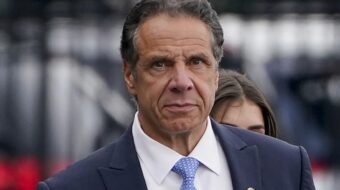Colombian left-wing leader Ricardo Palmera, also known as Simon Trinidad, was about to go on trial in Washington, D.C., for supporting terrorism and conspiring to take hostages, when on March 26 Judge Thomas Hogan unexpectedly removed himself from the case. The trial was called off.
Palmera supporters on hand outside the closed doors at the U.S. District Court saw the developments as a victory.
Palmera’s first trial ended in a mistrial on Nov. 21, 2006. Observers, notably activist lawyer Paul Wolf, say that happened because Palmera, a leader of the Revolutionary Armed Forces of Colombia (FARC), had been able to tell jurors why he joined the FARC and about the nature of oppression in Colombia. The jury refused to convict him.
That’s how Judge Hogan got in trouble. He had allowed prosecutors after that trial to quiz the jury foreman about influences on the panel’s thinking. That the defense team was excluded from the interview violated a basic rule of U.S. jurisprudence.
While the actual benefit to the prosecutor may have been insignificant, the legal issue was that the prosecutor and judge were working together behind the back of the defense attorneys. In the adversarial U.S. justice system, the prosecutor and judge are supposed to be independent.
The Palmera case is closely tied to U.S. policies toward Colombia, which are littered with military intervention, corporate profiteering and gross human rights violations.
When Palmera was captured with CIA help in Ecuador on Jan. 2, 2004, he had been preparing for negotiations on prisoner exchanges between FARC and Colombia’s right-wing Uribe government with James LeMoyne, the UN’s special representative for Colombia-FARC negotiations. Washington and President Alvaro Uribe are as one in rejecting humanitarian exchanges. Their alliance is cemented by an almost $5 billion U.S. military aid over seven years to the anti-FARC war.
Palmera is accused of playing an indirect role in the FARC capture of three U.S. military contractors, Marc Gonsalves, Tom Howes and Keith Stansell, when their small plane was shot down over Colombian territory in 2003. The three are still being held by FARC.
Although the FARC has said it would consider including the three contractors in a larger prisoner exchange, the Colombian and U.S. governments have ruled out a swap.
Despite that public stance, that may be what the Bush and Uribe administrations are forced to do. Bush is facing pressure from the contractors’ families and even their employer, Northrop Grumman, which urged using diplomatic and other nonmilitary options.
The severe human rights violations Colombians — especially workers and farmers — face every day, and the U.S. role in supporting these violations, is being questioned in Congress while a free trade agreement between the U.S. and Colombia is debated.
In Colombia, Uribe is facing serious allegations of being tied to right-wing paramilitary death squads.
Worldwide solidarity for Palmera is growing, especially as details surface about his treatment in U.S. hands. He remains in solitary confinement, cannot receive visitors, cannot call witnesses on his behalf, and must do with court-appointed lawyers.
Judge Royce Lamberth will be on the bench when Palmera’s next trial begins. After that, Palmera faces another round of prosecutions on charges of drug trafficking. He is to be tried in absentia in Colombia on similar charges.
Paul Wolf and others say that Palmera’s fate and freedom depends upon a campaign of solidarity and diplomatic solutions. A U.S. committee has been established in support of his release. For information on the committee, visit .
atwhit @ megalink.net









